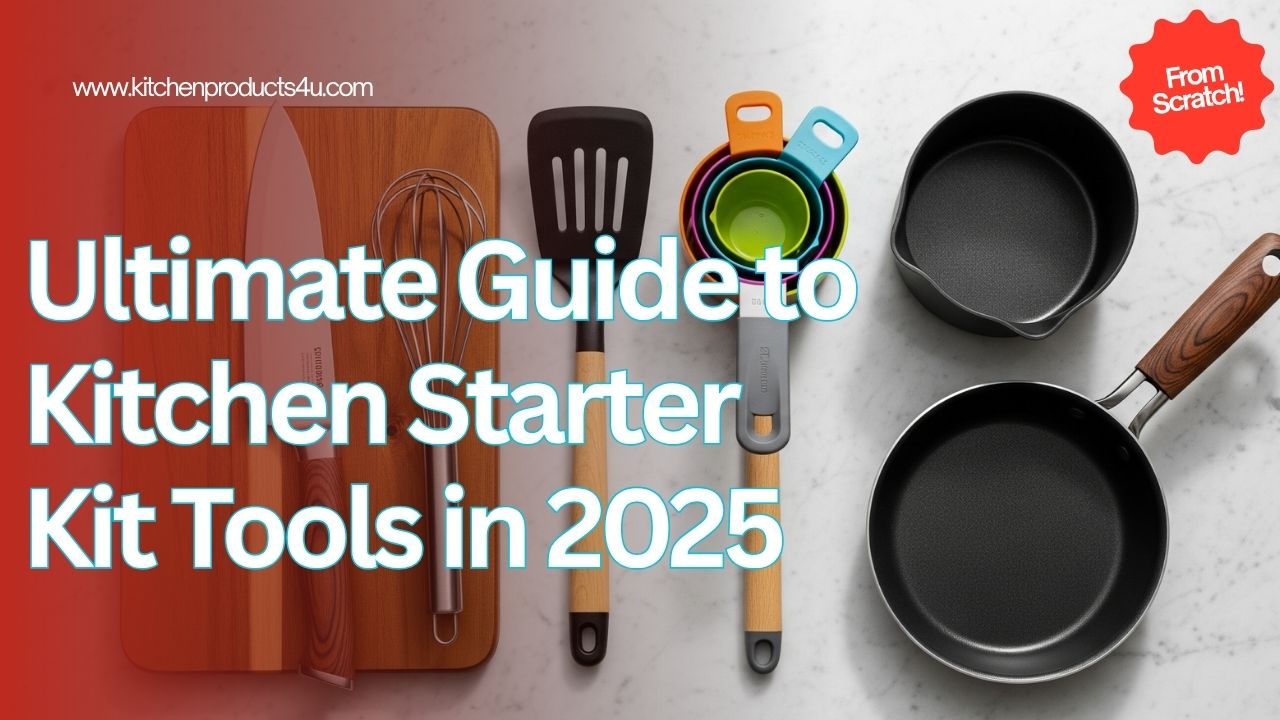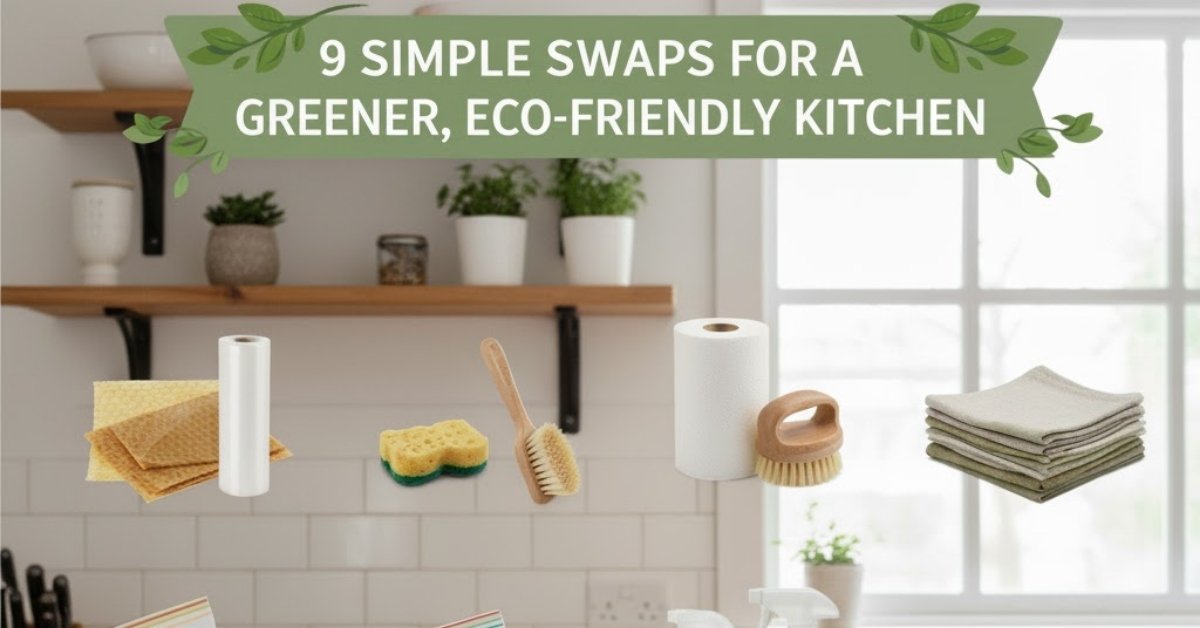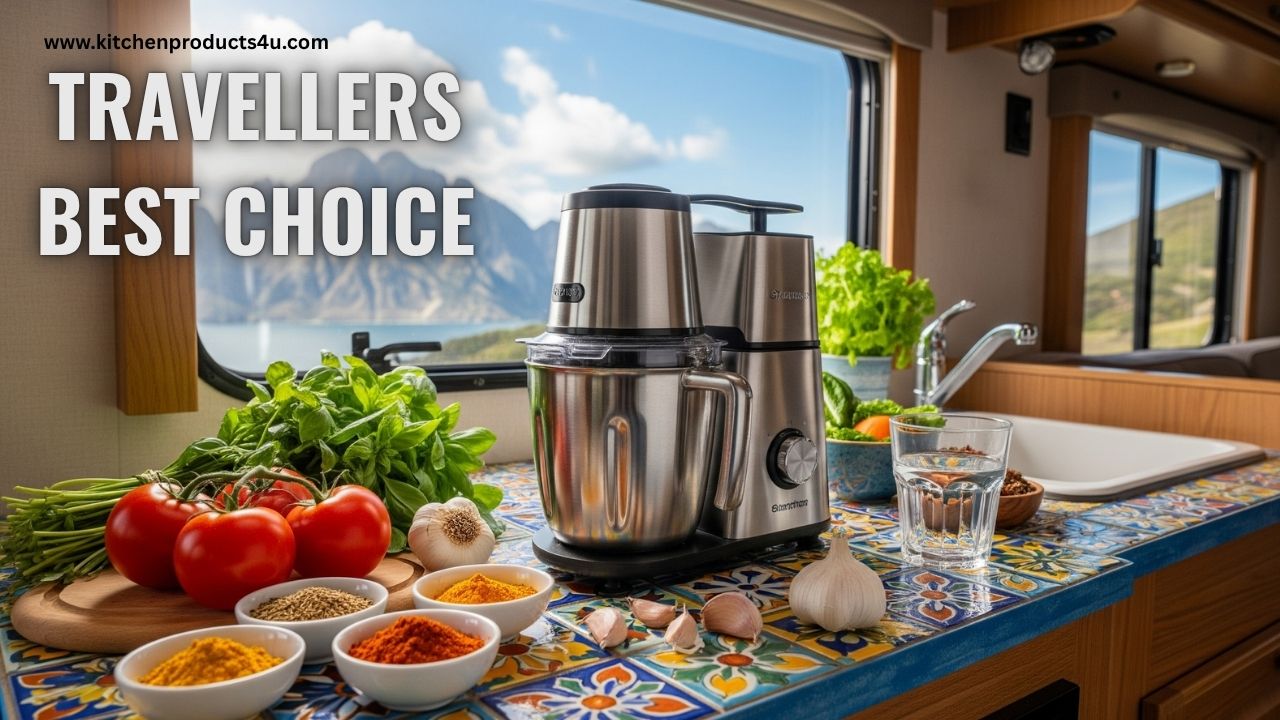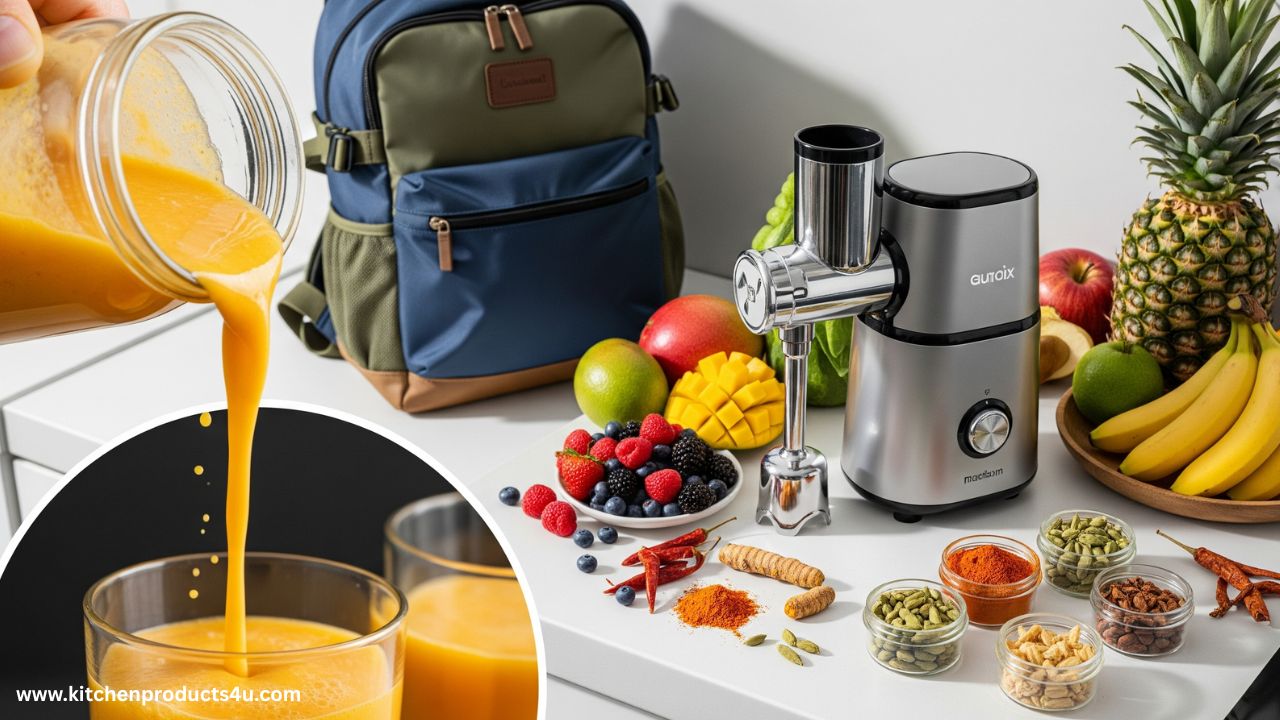Have you ever stood in front of a bright, empty kitchen, filled with a mixture of excitement and dread? You have the space, the dream of creating delicious food, but… where do you start? Forget those dreaded cooking shows where chefs effortlessly work with obscure gadgets. We’ve all been there – staring at a sea of specialized equipment and wondering which ones are worth it.
Honestly, you don’t need a high-end kitchen to cook incredible food. What you need is a well-thought-out kitchen starter kit tools. It’s not just about buying random utensils; it’s about strategically arming yourself for culinary success, building a foundation that will serve you for years to come. Think of it as your secret weapon, your culinary launchpad!
This guide is not just a checklist — it’s a research-backed, real-life-tested roadmap to help you stock your kitchen smartly, affordably, and stylishly.
Contents
- 1 Why Kitchen Starter Kit Tools Matter
- 2 Must-Have Kitchen Tools to Get You Cooking Instantly
- 3 Measuring Up: Precision for Perfect Results!
- 4 Cookware That Covers All Your Bases
- 5 Must-Have Kitchen Gadgets for Efficiency
- 6 Appliances You Can’t Ignore
- 7 Kitchen Cleaning Essentials You Need From Day One
- 8 Pantry Tools That Maximize Storage and Use
- 9 Bonus Tools That Make You Feel Like a Pro
- 10 Tips for Building Your Kit!
- 11 Here’s some advice from someone who’s been there:
- 12 Your Kitchen Awaits!
- 13 FAQ
Why Kitchen Starter Kit Tools Matter
Before we get into the details, let’s look at why it’s important. In addition to the obvious benefits of being able to cook, a well-equipped kitchen starter kit offers an array of amazing benefits:
- Saves You Money (Seriously!): Do you find cooking too difficult, so you buy pre-made meals or rely too much on takeout? Organizing your kitchen means you’ll cook more at home, which can lead to significant savings. A 2017 study published in the American Journal of Preventive Medicine found that cooking at home more often leads to lower food costs.
- Benefits of a Well-Planned Starter Kit: A kitchen starter kit takes the guesswork out of it. It focuses on the things you use every day. It’s cost-effective, space-saving, and makes cooking a lot less intimidating.
- Boosts Your Health & Well-being
- Unleashes Your Inner Foodie
- Sustainable Living, One Meal at a Time
So, are you ready to transform your kitchen from a storage space to a culinary sanctuary? Let’s go. Don’t waste any time
Must-Have Kitchen Tools to Get You Cooking Instantly
Basic Utensils Every Kitchen Needs
If there’s one more investment you can make, it’s your knife. A sharp knife isn’t just a pleasure to use; it’s a safety tool! Dull knives are actually more dangerous because they require more force, which increases the risk of slipping.
- Chef’s Knife (8-inch): This is your main tool, a kitchen wouldn’t be a kitchen without it. From chopping vegetables to slicing meat, a good 8-inch chef’s knife will handle 90% of your cutting tasks. Look for a comfortable grip and a blade that holds its edge well.
- Paring Knife (3-4 inch): For delicate tasks like peeling fruits, mincing garlic, or coring tomatoes, a small paring knife is indispensable.
- Bread Knife (Serrated): If you love crusty bread (and who doesn’t?), a serrated knife is essential for clean slices without squishing your loaf.
- Cutting Boards – The Unsung Hero (At Least Two!): One for raw meat and the other for produce to prevent cross-contamination. Wood, bamboo, or high-density plastic are good choices.
Tip: A chef’s knife and sturdy cutting board can do 80% of your meal prep.
Measuring Up: Precision for Perfect Results!
Cooking, especially baking, is a science! Accurate measurements are key to consistent results.
- Dry Measuring Cups (1 cup, 1/2 cup, 1/3 cup, 1/4 cup): For flour, sugar, and other dry ingredients.
- Measuring Spoons (1 tbsp, 1 tsp, 1/2 tsp, 1/4 tsp): For spices, extracts, and smaller quantities.
- Liquid Measuring Cup (2-cup or 4-cup capacity): Clear, with easy-to-read markings for water, milk, and oils.
Cookware That Covers All Your Bases
These are the utensils where your culinary magic happens. You don’t need a huge collection, just the right size and type.
The Core Four for Cooking Magic
These pieces form the foundation of your cookware arsenal:
- 10-Inch Non-Stick Skillet: Great for frying eggs, pancakes, and vegetables.
- 2-3 Quart Saucepan with Lid: Ideal for soups, sauces, rice, and reheating.
- 6-Quart Stockpot: Perfect for pasta, stews, or meal prepping.
- Cast Iron Skillet (Optional, but highly recommended!): Once seasoned, these become virtually non-stick and are fantastic for searing, frying, and even baking. They last a lifetime!
Real-Life Use: One of our readers switched to a cast iron skillet and said their morning omelet finally stopped sticking.
Must-Have Kitchen Gadgets for Efficiency
Time-Saving, Budget-Friendly Gadgets
The right gadgets make kitchen tasks faster, easier, and safer:
- Can Opener: Manual or electric — you’ll use it more than you think.
- Meat Thermometer: The key to perfectly cooked meats and food safety. No more guessing games!
- Vegetable Peeler: Choose an ergonomic handle for comfort.
- Box Grater: Cheese, veggies, even zest — this does it all.
- Colander: Essential for draining pasta, rinsing veggies, or washing grains.
- Mixing Bowls (Set of 3): Stainless or BPA-free plastic, with lids preferred.
- Ladle: For serving soups, stews, and sauces.
- Whisk: For emulsifying dressings, whipping eggs, or smoothing out gravies.
- Spatulas (Silicone & Metal): Silicone spatulas are fantastic for scraping bowls and working with non-stick surfaces. A sturdy metal spatula is great for flipping heavier items.
- Baking Sheets (Cookie Sheets): For roasting vegetables, baking cookies, and more.
According to a 2024 consumer study by Kitchen Trends Magazine, 87% of home cooks listed their vegetable peeler among the most-used tools.
Appliances You Can’t Ignore
The items mentioned below you can’t ignore because its used every day in the kitchen.
Game-Changing Small Appliances
While you can cook with just pots and pans, these small appliances supercharge your kitchen:
- Blender: Smoothies, soups, sauces — a blender handles it all.
- Toaster or Toaster Oven: For breakfast and quick reheating.
- Microwave Oven: Reheating, defrosting, and even steaming veggies.
- Rice Cooker or Instant Pot: One-pot meals, hands-free rice, and more.
- Electric Kettle: Tea, coffee, quick hot water for pasta or oats.
- Hand Mixer (or Stand Mixer if space/budget allows): For baking enthusiasts, a mixer makes whipping, beating, and kneading a breeze.
- Food Processor (Small or Medium): Great for chopping vegetables, making purees, or even preparing dough.
Tip: An Instant Pot replaces up to 7 appliances. It’s a game-changer for college students and busy professionals.
Kitchen Cleaning Essentials You Need From Day One
Only cooking items are not members of the kitchen also cleaning items are members of every kitchen. Don’t forget.
Keep It Clean with These Basics
No kitchen is complete without cleaning tools to keep things safe and sanitary:
- Dish Rack or Drying Mat
- Dish Soap and Sponge (Non-scratch)
- Scrub Brush for Pots and Pans
- Microfiber Towels or Dishcloths
- All-Purpose Cleaner (Food-Safe)
Tip: A clean kitchen is a safer kitchen. Cross-contamination is one of the top causes of foodborne illness in Indian and US households.
Pantry Tools That Maximize Storage and Use
Organization is Half the Battle
Keep your dry goods organized and fresh with:
- Airtight Containers (BPA-free or glass): For flour, grains, and snacks.
- Spice Rack or Magnetic Spice Jars: Find what you need at a glance.
- Lazy Susan or Turntable Tray: For oils, sauces, or condiments.
Tip: Studies show organized kitchens reduce food waste by 35% by helping home cooks use more of what they already have.
Bonus Tools That Make You Feel Like a Pro
Tools You’ll Appreciate Over Time
These aren’t “must-haves” on day one — but trust me, they’ll soon feel essential:
- Tongs (Silicone-Tipped)
- Kitchen Shears
- Digital Thermometer
- Rolling Pin & Pastry Mat
Story: A beginner baker told us their confidence tripled once they used a thermometer to avoid overcooking chicken or underbaking banana bread.
Tips for Building Your Kit!
My own kitchen i don’t have most kitchen starter kit tools journey began with a handmade pot and a dull knife. I vividly remember the frustration of cutting onions with a butter knife – it was no fun! Cooking was truly a joy before I bought a good chef’s knife. Similarly, discovering the magic of the immersion blender for creamy tomato soup was also a strange discovery!
Here’s some advice from someone who’s been there:
- Start Small, Build Gradually: You don’t need to buy everything at once. Focus on the “absolute must-haves” first, and then add items as you realize you need them for specific recipes or cooking styles.
- Quality Over Quantity: It’s better to have fewer, high-quality tools that will last for years than a drawer full of flimsy gadgets that break after a few uses. Think of it as an investment.
- Consider Your Cooking Style: Are you a baker? A grill master? Do you love Asian cuisine? Your specific interests might dictate some additional specialized tools.
- Shop Smart: Look for sales, check out reputable online retailers, or even consider thrift stores for hidden gems (just be sure to sanitize them well!).
- Read Reviews: Before buying, always check online reviews to get an idea of a product’s performance and durability.
Your Kitchen Awaits!
Building a kitchen starter kit isn’t just about stocking up on stuff; it’s about empowering yourself to cook, explore, and truly enjoy the heart of your home. With these essential tools, you’re not just buying equipment; you’re investing in countless delicious meals, memorable gatherings, and the sheer joy of creating something great with your own hands.
So, go ahead, future culinary hero! Your kitchen adventure is just beginning. What’s the first dish you’ll conquer with your new arsenal of tools? Share your thoughts in the comments below!
FAQ
What is the most important tool in a kitchen starter kit?
The chef’s knife. It handles most of your prep work and makes cooking easier and faster.
How much should I budget for a complete starter kit?
Expect to spend ₹2,500–₹5,000 in India and $50–$100 in the USA for a basic but functional setup.
Can I buy a pre-assembled starter kit online?
Yes, both Amazon and Flipkart offer pre-packed kitchen starter kits, often with discounts.
What’s a good alternative to non-stick pans?
Stainless steel or cast iron pans are excellent and durable if maintained properly.
Do I need baking tools even if I don’t bake?
Some, like mixing bowls and spatulas, are multipurpose and great for everyday cooking too.








